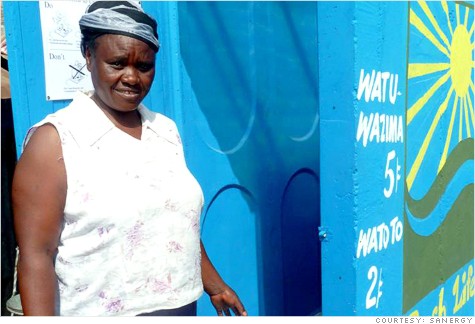
Kenyan entrepreneur Agnes Kwamboka operates a Fresh Life pay-per-use toilet franchise.
NEW YORK (CNNMoney) -- In China's Hunan Province, using the bathroom often means squatting over a dirty hole in the ground. An estimated 2.5 billion people around the world lack adequate sanitation -- more than a third of the global population -- and 2 million die each year of diarrheal disease.
To David Auerbach, that is both a human-rights crisis and an entrepreneurial gold mine. He and his business partners hatched a plan for profiting on both ends of a messy problem: Sell pay-per-use toilets to local entrepreneurs, then collect the waste and sell that too, after converting it into fertilizer.
Auerbach spent several years in China teaching English after college, then moved on to stints at the Clinton Foundation and Endeavor, a non-profit that supports entrepreneurs in emerging markets. At MIT's Sloan School of Management, he teamed up with fellow grad students Ani Vallabhaneni and Lindsay Stradley. Vallabhaneni had worked with a chain of dialysis clinics for low-income patients in the Philippines, and Stradley was a veteran of Teach for America and Google.
On a trip to Kenya, the trio saw locals paying about 5 cents to use an unlined pit latrine. Even more common were "flying toilets" -- plastic bags used as a toilet, tied off and then thrown outside. The ground is often covered in them.
When they returned, the three cofounders -- all 31 now -- wrote the business plan for Sanergy and its brand of Fresh Life toilets. Their vision won the 2011 MIT $100K Entrepreneurship Competition and landed the $100,000 Diamond Prize at the 2011 MassChallenge Startup Competition and Accelerator.
A Fresh Life toilet is 3' x 5' and made of prefabricated concrete. The floor has a squat plate and two holes, one for urine and one for solid waste, that lead down to removable waste cartridges. The toilets are sold at cost for $500, which includes installation, painting and daily waste collection. Owners are considered franchisees and have to supply toilet paper, soap and a hand-washing stand.
Right now, Stradley says, there are 150 toilets operating in Nairobi's crammed Mukuru slum, and the company is selling another five to 10 toilets per week. About a third of Fresh Life operators have already purchased an additional unit.
Bob Orengo, a franchisee in Mukuru, sees about 47 customers a day. At five Kenyan shillings a pop, that's about U.S. $19 a week.
"It's a good way to start your own business and be self-employed," he told CNNMoney through an interpreter.
Another Fresh Life operator in Mukuru, Esther Muniyiva, has about 96 customers a day and makes around $40 a week. The big benefit, she says, is that the area around the toilet is clean: "Some people think the toilet is so clean that they could eat in there too."
Joshua Boger, the former CEO of Vertex Pharmaceuticals, was one of Sanergy's judges in the MassChallenge competition. He says one of the company's biggest challenges now is how fast to scale up.
"You don't build a fertilizer plant for a million people if you only have 100 customers, so they have to go slow -- but not too slow," he says.
Related story: 7 best new global cities for startups
Sanergy collects about 1.5 tons of waste each day and sold its first batch of fertilizer in July -- two tons at market price, which generally runs $300 to $600 a metric ton, Stradley says. That's about twice the global price because, thanks to a local fertilizer shortage. It's badly needed by Kenya's huge horticulture industry, one of the largest flower exporters to Europe.
It takes Sanergy four to six months to change raw human waste into fertilizer. The process could be sped up with an investment in infrastructure, and Stradley says the company plans to build a high-tech waste management facility within the next year.
The same waste can be used for both fertilizer and biogas, but the company isn't operating at a scale yet where it makes sense to generate electricity to sell back to the grid, Stradley says: "We need about a thousand toilets to have enough waste to do that."
If Sanergy's plans pan out, that won't be a problem. Within five years, the company's founders want to provide toilets to more than half a million Africans, generating 11,000 tons of fertilizer annually and 7.5 million kilowatt-hours of electricity.
Their aim is to be profitable within 18 months and to raise an equity investment round of $2 million in early 2013. But investors might question whether the model is sustainable, says Jenny Aker, an assistant professor of development economics at the Fletcher School at Tufts University whose research focuses on West Africa.
"If sanitation services aren't commonly used or culturally appropriate, would the community be willing to pay for it?" she asks. If Sanergy expands into rural areas, the impact will probably be much lower than in urban zones , simply because there are fewer potential customers, says Aker.
And there's the issue of using human waste as fertilizer. It's fine if it's just used in the flower industry. "What would people think about using human manure as part of growing their food?" Aker asks. "That's something to consider long-term." ![]()
First Published: December 3, 2012: 5:36 AM ET
Anda sedang membaca artikel tentang
Sanergy turns poop into profit in Kenya's slums
Dengan url
http://ngopingeteh.blogspot.com/2012/12/sanergy-turns-poop-into-profit-in.html
Anda boleh menyebar luaskannya atau mengcopy paste-nya
Sanergy turns poop into profit in Kenya's slums
namun jangan lupa untuk meletakkan link
Sanergy turns poop into profit in Kenya's slums
sebagai sumbernya
0 komentar:
Posting Komentar